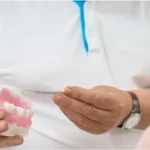Dental bonding typically lasts 4 to 8 years, but the longevity can vary based on several factors. While bonding is durable and provides a natural-looking result, it may be more prone to staining and wear. It requires periodic touch-ups or replacements by a dentist to maintain its integrity.
As a temporary yet one of the most popular and transformative smile correction procedures, dental bonding provides aesthetic enhancement and a practical method of fixing dental problems.
Factors Affecting The Lifespan Of Dental Bonding
Various factors influence the lifespan of dental bonding. Understanding these can help manage expectations and tooth bonding aftercare appropriately. Key factors affecting the lifespan of dental bonding include –
1. Material Quality
The quality of the materials used profoundly influences the longevity of dental bonding. High-grade composite resins and advanced bonding techniques contribute to a more durable and resilient outcome.
2. Strategic Application Sites
The precise locations where dental bonding is applied significantly impact its durability. The placement of bonding material on the front teeth, where visibility is high, requires meticulous attention to aesthetics. Alternatively, structural issues in less visible areas may require a different approach.
3. Surface Area
The surface area being treated directly influences the quantity of bonding material used. Larger surface areas or areas subjected to higher bite forces may necessitate a more substantial application for optimal strength and longevity.
4. Oral Hygiene Practices
The way you care for your bonded teeth directly impacts their lifespan. Rigorous oral hygiene, including regular brushing and flossing, helps avoid stained teeth.
5. Dietary Habits
What you eat and drink can significantly affect the lifespan of dental bonding. Enjoy the benefits of mouth-healthy foods and refrain from some dietary practices. Avoiding excessive consumption of sticky food or staining agents like coffee, tea, and red wine and refraining from biting nails or hard objects helps preserve the bonding material.
Proper maintenance and regular dental check-ups are crucial for extending the lifespan of dental bonding, ensuring a lasting and aesthetically pleasing outcome.
When Should You Replace Dental Bonding?
Here are common signs that indicate the need of dental bonding replacement –
- Noticeable signs of deterioration, such as roughness or uneven texture on the bonded surface.
- Any visible chips or fractures in the bonding material that compromise the appearance or function of the tooth.
- Stubborn discoloration affects the overall aesthetics and doesn’t respond to professional teeth whitening treatments.
- Alterations in your bite or tooth alignment may impact the integrity of the bonding material.
- Development of decay around the edges of the bonding, compromising the structural support of the tooth.
- Persistent pain or discomfort around the bonded tooth, indicating potential issues with the bonding or underlying tooth structure.
By keeping regular dental bonding consultations, you can identify such changes early, ensuring that dental bonding is replaced promptly and your natural teeth are preserved.
Revitalize Your Smile with Exceptional Dental Bonding Solutions
For unparalleled dental bonding, trust the expertise of Dallas Dental Implant Center & Cosmetic Dentistry. Our commitment to excellence ensures that your smile receives the meticulous care it deserves.
Explore the artistry of dental bonding with the best dentist in Dallas. Call us at 214.350.8678 to schedule your appointment for transformative results.







